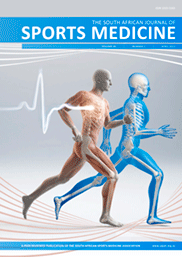Steps that count! A feasibility study of a pedometer-based, health-promotion intervention in an employed, South African population
DOI:
https://doi.org/10.7196/SAJSM.500Keywords:
pedometer, moderate intensity physical activity, brisk walking, steps that countAbstract
Background. The emergence of the pedometer as a useful motivational aid for increasing physical activity (PA) has supported its use in PA interventions.
Objectives. To examine the feasibility of a 10-week pedometer-based intervention complemented by regular motivational messages, to increase ambulatory PA; and to determine the minimum sample size required for a randomised, controlled trial (RCT).
Methods. Participants, sourced by convenience sampling of employees from an academic institution, were randomly assigned to either an intervention group (IG) (n=11) or control group (CG) (n=11), following baseline health measurements and blinded pedometer wear (week 1). Participants in the IG subsequently wore an unblinded pedometer (10 weeks) to self-monitor daily steps. Individualised messages using pedometer data (IG) and general motivational messages (IG and CG) were provided bi-weekly. Blinded pedometer wear (IG and CG) and a feedback questionnaire (IG) were completed at week 12. Pedometer data were compared between the IG and CG at week 12.
Results. Participants’ perceptions of the intervention supported the benefit of the pedometer as a useful motivational aid and a reminder to increase steps per day. Occupational sitting time and inability to incorporate PA into daily routine emerged as the main barrier to adherence. Steps per day increased more in the IG (mean ± standard deviation (SD) 996±1 748) than in the CG (mean±SD 97±750). Modest improvements were noted in all clinical measures (IG).
Conclusion. Based on the improvement of 1 000 steps/day (IG), a minimum of 85 participants in the IG and CG, respectively, is required for a future RCT (80% power; p<0.05). We recommend a minimum of 150 participants in each group to account for loss to follow-up and to allow for subgroup analyses.
Downloads
Downloads
Additional Files
Published
Issue
Section
License
Copyright (c) 2014 South African Journal of Sports Medicine

This work is licensed under a Creative Commons Attribution 4.0 International License.
The South African Journal of Sports Medicine reserves copyright of the material published. The work is licensed under a Creative Commons Attribution 4.0 (CC BY 4.0) International License. Material submitted for publication in the South African Journal of Sports Medicine is accepted provided it has not been published elsewhere. The South African Journal of Sports Medicine does not hold itself responsible for statements made by the authors.
How to Cite
- Abstract 721
- PDF 556
- Figure 1; Figure 2 73
Metrics

- Citations
- Citation Indexes: 3
- Policy Citations: 1
- Usage
- Full Text Views: 1003
- Abstract Views: 317
- Captures
- Readers: 16





.png)